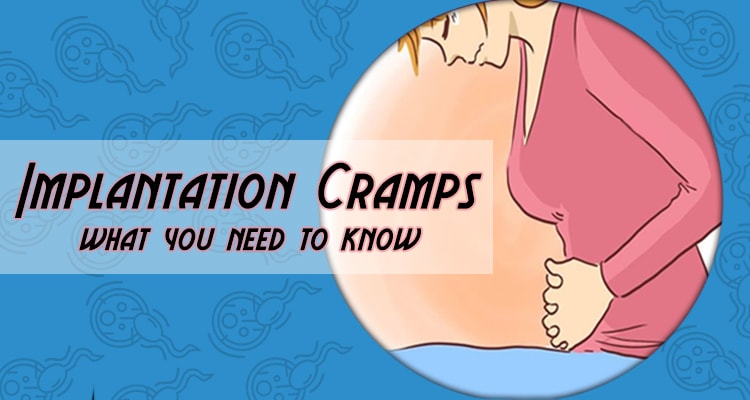Implantation Bleeding
During pregnancy, implantation is the process where the fertilized egg attaches to the uterine lining, and this process occurs approximately 6 or 7 days after the conception. This process is usually called Implantation.
If you know you are pregnant, and if you notice any pink or brown spots (Bleeding), during the 6-12 days-old fertilized egg attaches to the interior lining of the uterus, which is known as implantation bleeding. Many women mistake this to be regular periods as it takes place during the time of their monthly period cycle. Usually, this occurs during the 3rd week of their pregnancy. Implantation bleeding is very common and often occurs in about 25 per cent of pregnancies. In most of the cases, it is the first sign of pregnancy.
Symptoms and causes of Implantation Bleeding:
Usually, the menstrual bleeding last for five to seven days with a heavy flow to light flow and the colour of the blood is red or brown but during implantation bleeding it may be light in colour than the usual menstrual blood.
Apart from this, you could also experience one or more symptoms mentioned below:
1. You may experience mild cramping and morning sickness. Some women tend to experience slight cramps which are usually lighter than the usual menstrual cramp2. The flow will lighter than the typical menstrual cycle.
3. You may often get mood swing, headache, and nausea.
4. You will experience a tender breast.
5. Some women get lower backache.
You need not worry much about the implantation bleeding, and it is a usual process that occurs in most of the pregnant women. The egg (fertilized) attaches to the uterine lining, and this process occurs approximately 6 or 7 days after the conception. After which the embryo starts to develop. In some cases, as the fetus begins to attach, it may lead to little bleeding and mild cramping. This doesn’t cause any problems for the fetus inside the uterus.
Usually, implantation bleeding needs no treatment and does not cause any concern or gives any risk to the developing child in the uterus. But if you find you are pregnant and if you experience spotting or bleeding more than 2 to 3 days after your missed menstrual cycle it is not an implantation bleeding, and then you should concern about. Yes, of course, this implantation bleeding is not said to be normal, there are a few reasons it may occur:
• Irritation in the cervix
• Irritation or tiny tears from intercourse
• Heavy lifting or excessive exercise/exertion
• Vaginal infection
How long implantation bleeding occurs?
When a woman is going through her first pregnancy will mostly experience spotting or a little bleed as the process is new for her body. In many cases, implantation bleeding may last for a few hours or 2 to 3 days.
The period cycle is mentioned as follows:
Day 1: First day of the regular period
Day 14 to 16: Ovulation takes place
Day 18 to 20: fertilization takes place
Day 24 to 26: Implantation takes place, and implantation bleeding occurs for about 2 to 7 days.
Many women, nearly 50% of women experience spotting (not implantation bleeding) and lead to having a normal and healthy pregnancy. Bleeding or spotting extended to more days can be a sign of miscarriage, especially further on during the pregnancy. If you are in your first trimester, consult your doctor about your bleeding/spotting. Let your Doctor know at once about any spotting in your second or third trimesters. If there is heavy bleeding during your pregnancy, contact your doctor immediately for his medical attention.
Other causes for bleeding
If you’re pregnant and if you notice blood it may be reasons other than implantation also, Here are some reasons:
Sex: If you are pregnant and if you have sex, sometimes it may lead to some spotting this happens at the early stage of pregnancy or even at any time of pregnancy, in most cases it stops on its own.
Ectopic pregnancy: When implantation occurs outside of the uterus then this is called ectopic pregnancy. You will experience bleeding with pain and cramps. This is very dangerous, and you need to consult your doctor immediately.
Miscarriage: About 15% to 20% of women lead to miscarriage in the first few months. Many women have bleeding with heavy cramp later. Consult your doctor immediately if you are pregnant and if you experience these symptoms.
If you want to be pregnant now or later in life? It is important to know when your ovulation period happens. Wrong information about ovulation or ovulation may increase the obstruction of your conception. Now the question arises, what is ovulation meaning in Hindi and ovulation period? You can read our blog Ovulation cycle in hindi This will help you…








 Users Today : 3
Users Today : 3 Users Yesterday : 798
Users Yesterday : 798 This Month : 11489
This Month : 11489 Total Users : 792480
Total Users : 792480